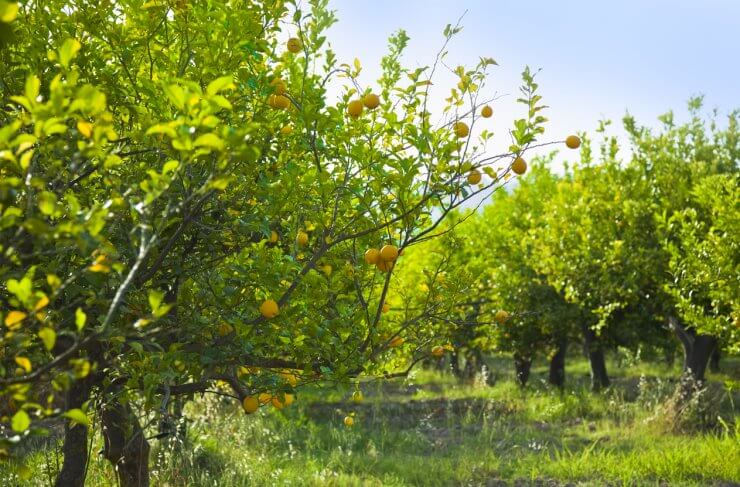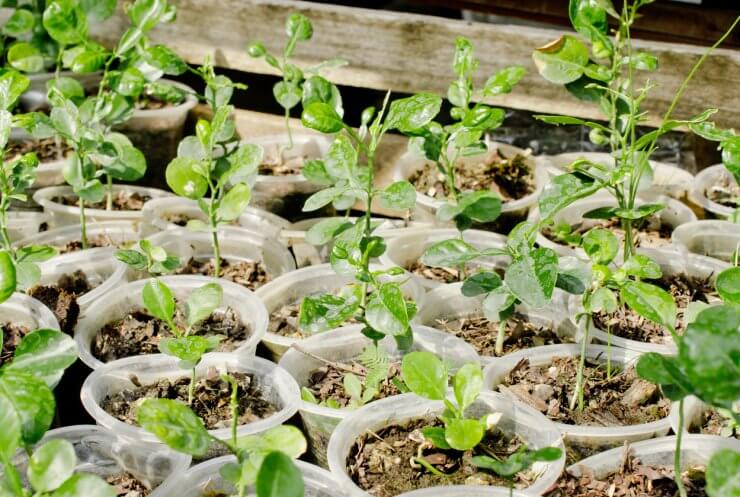
Lemon trees in a grove
Lemons love sunshine and well-draining soil. Lemons have a reputation for not being especially picky about the quality of their soil, as long as it has a pH between 5.5 and 6.5. And as long as the soil drains well, they seem to be fairly adaptable.
The lemon tree’s relatively easygoing nature means you have a number of options on where to plant your tree, depending on the USDA Hardiness Zone you live in, whether you have open ground that’s suitable for a lemon tree to flourish, or if you have the right lighting requirements indoors and out if your tree needs to spend the winter inside.
If you live beyond the ideal outdoor growing zone for lemons (zones 8 to 11), you can grow your lemon tree in a container. Let it spend the warm, sunny months outside and bring it in before the first frost. Keep it in a sunny, south-facing room away from outdoor drafts, and your lemon tree will be happy and productive for years!
The keys to having happy lemon trees are sunlight, well-drained soil, and warm temperatures. If you can provide those three things, you can grow lemons just about anywhere.
Raised beds and open ground

A variety of lemon seedlings, ready for planting in open ground or raised beds
A raised garden bed or planter is an excellent option for growing lemons if you don’t have soil that’s ideal for lemon trees (heavy clay soil, for example). Raised beds also help with drainage, which is essential for a healthy lemon tree. You can even buy raised beds or build one yourself to fit your space.
Watering and weeding will be easier if you have your lemon tree in a raised bed or planter; harvesting may become a bit of challenge if you plant your tree in a raised bed that’s on the high side. If you build a raised bed specifically for your lemon tree, then you can plan the size of the bed to make it easily accessible even when your tree gets taller. It’s a good alternative to growing in open land. And if you fill a raised bed with packaged garden soil, you’re providing a cleaner and healthier environment for your trees from the outset.
Packaged garden soil means less weeding than you’d have from digging a hole in the ground; and with a raised bed or container, there’s less bending down to do your weeding!
Lemons are really a gardener-friendly plant, and they’ll grow well in open ground—as long as they have plenty of sunshine, good drainage, and the right pH (5.5 to 6.5). If you’re lucky enough to live in a zone where your lemon trees can live outdoors year-round, consider incorporating lemons into your garden.
As much as you may be tempted, don’t plan to plant a lemon tree in your yard. Lemon trees and grass have different water requirements, and planting them together means one of them will lose out.
How do you grow your lemons—in open land, in raised beds, or in containers? Why do you prefer your method? Please tell us your tips and tricks for growing great lemons!


 Previous
Previous


Why can we buy a Lemon Tree from a Nursery and have it chip to Arizona?
In order to control the spread of the Asian Citrus Psyllid (ACP) you cannot ship uncertified lemon trees into Arizona from another state or online. ACP is a threat to Arizona’s citrus industry because it is known to be a carrier of the bacteria that causes Citrus Greening Disease. Once infected, this disease will ultimately kill the tree within a few years.
We suggest that you visit your local nursery and ask them to help you purchase or locate a certified ACP-free tree.
Good luck and let us know how it goes.